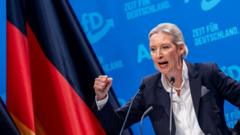The recent conference of the Alternative für Deutschland (AfD) party, held in Riesa, Saxony, has signaled a notable shift in their immigration policies as the German elections approach. Alice Weidel, the party's co-leader, emphasized a commitment to what she termed "remigration," a phrase that many critics have labeled a euphemism for mass deportations. This marked a striking change from her efforts a year prior to distance the party from accusations of racism following a scandal linked to the concept.
During the conference, Weidel outlined the AfD’s aims to close borders and proposed a controversial manifesto that includes withdrawing from the Paris climate agreement and exiting the Euro, all of which reflect a strong anti-European Union stance. These proposals coincided with substantial protests outside the event, showcasing widespread dissent against the AfD's agenda.
Weidel characterized the demonstrators as a "left-wing mob," and assured her supporters of "large-scale repatriations" while fully embracing the "remigration" terminology. This pronouncement underscores the AfD's growing confidence and radicalization, particularly among its supporters in Eastern Germany, where recent regional elections showed increased party gains.
Critics argue that the concept of remigration could target not only asylum seekers but also legal residents and those seen as "non-assimilated." However, Weidel and her party maintain that their plans will not forcibly remove legal residents, despite the chilling implications of their rhetoric. The party's history with extreme positions and links to right-wing extremism—highlighted by past comments from prominent members like Björn Höcke—has brought severe scrutiny.
Despite their controversial standing, the AfD continues to gain traction in public opinion polls, ranging around 20% nationally. The party's populist, anti-immigrant narrative, bolstered by Weidel's prominence and even endorsements from figures like Elon Musk, seems to resonate with a significant segment of the German electorate.
Some see Weidel's leadership as an attempt to soften the party's image, yet opposition figures argue that her approach merely disguises underlying extremist views. As Germany approaches its federal elections, which are set for February 23, the stage is being set for a contentious political atmosphere fueled by the AfD's divisive proposals and the societal reactions they elicit.





















